In the nearly 20 years since his debut film, Following, Christopher Nolan has become one of the major figures in modern Hollywood, as well as one of the most divisive.
Some see him as a genius, the heir to Kubrick and the saviour of big-budget cinema. Others see him as too cold and clinical, that he overuses exposition and is incompetent at directing action. Wherever you fall on the spectrum, Nolan’s impact on cinema can’t be ignored, neither can his ambition. He’s constantly taking risks, from making a superhero film that was a pastiche of Michael Mann crime thrillers and greek tragedy (The Dark Knight) to blending the scientific and the spiritual (Interstellar). His latest film is Dunkirk, based on the true story of Operation Dynamo, whose goal was the evacuation of the allied troops off the beaches of Dunkirk during WWII. With the film this weekend, let’s look back at Nolan’s career to date.
Nolan directed several short films before making his first full-length film, the aforementioned Following (1998). The had an estimated budget of $6,000 and the cast and crew could only work on Saturdays for a short period of time. The film featured many plot elements and themes which appear through out Nolan’s subsequent films: the non-linear storytelling, the men who become lost in their obsessions and their work, and duality of nature. It was also a neo-noir, a genre Nolan would explore in several other films.
The film’s story concerns a young writer in London named Bill (Jeremy Theobald) who likes to follow people around the city. One day he is confronted by one of those people, a burglar named Cobb (Alex Haw) who brings Bill into his world. Following is Nolan’s least sentimental, featuring his most darkly ironic ending. The film is very much a test-run and learning exercise for Nolan but it’s a solid little noir with an intriguing storyline.
Nolan’s true breakthrough was Memento (2000), which became notable for its backward story-structure. It wasn’t the first film to structure its story backwards but what made it distinct was its main character, Leonard Shelby (Guy Pearce), a man attempting to find the man who broke into his house and raped and murdered his wife, and gave Leonard a injury which resulted in short-term memory loss. Leonard has tattoos and polaroids which allow to keep track of his investigation. When each scene begins, we are in Leonard’s position of not knowing how we got here, while at the same staying one step ahead because we then see what happened prior. However, by the conclusion/beginning we realize we only thought we knew more than Leonard did. We learn that Leonard manipulates his memories and clues so he continually search for “John G.”
Some have dismissed Memento as being merely a gimmick but I think this film is a great character study of a man attempting to give his life a false sense purpose after losing what gave it purpose. It’s about being perpetually stuck in the present; as he remarks to Natalie (Carrie Ann-Moss), the film’s femme fatale, his condition prevents him from healing emotionally. He can’t “feel time” so he can’t move forward. Memento would firmly establish Nolan as an exciting new filmmaker and allowed him to make a mainstream Hollywood film.
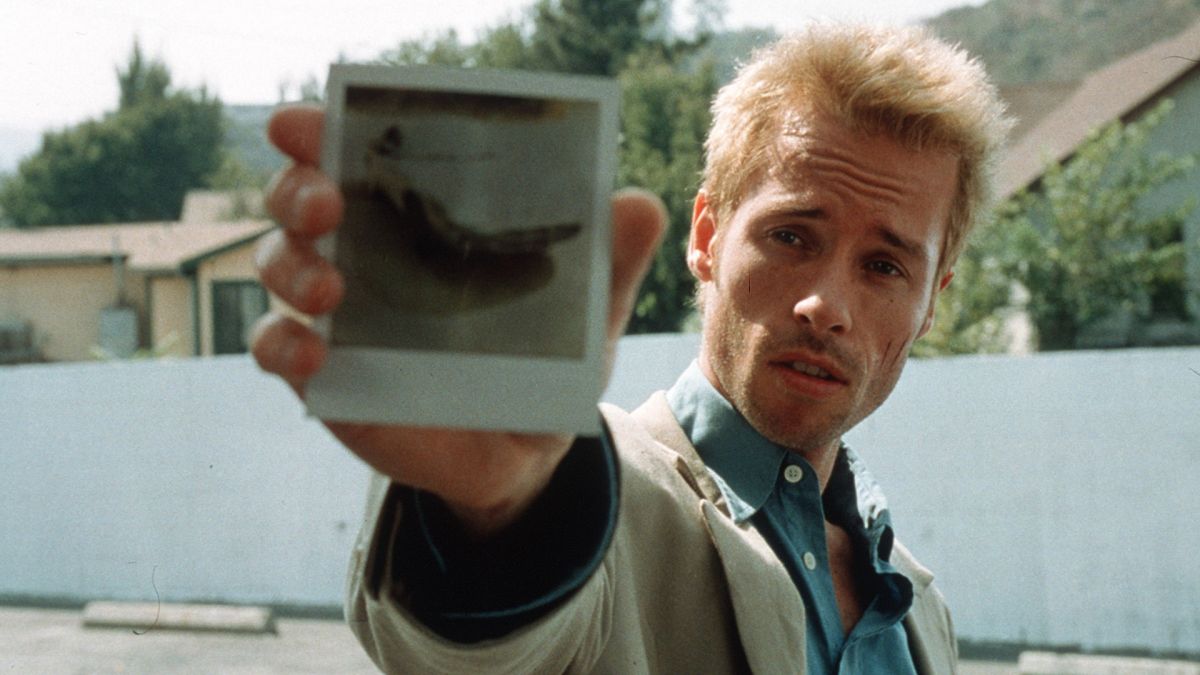
His next film would be Insomnia (2002) for Warner Bros., a remake of the 1997 Swedish film starring Stellan Skarsgard. Insomnia is perhaps Nolan’s most work-for-hire film but it lines up thematically with his other films: the morally grey hero who’s fighting a psychological battle that’s reflected externally in another character and memory’s deceptive nature.
Nolan had more star power than he ever had before, with Al Pacino, Robin Williams and Hillary Swank. Pacino plays L.A. detective WIll Dormer who along with his partner Hap Eckhart (Martin Donovan) travel to an Alaskan town at a time where the sun never sets to investigate the murder of a teenage girl. The investigation leads to crime novelist Walter Finch (Williams); while pursuing Finch Dormer accidently kills Eckhart, though he doesn’t confess. Due to his guilt, Dormer begins to suffer from insomnia.
The film isn’t really a whodunit. Rather, it’s more concerned with Dormer’s guilt for Eckhart’s death and his past mistakes. This is one of Pacino’s best late-career performance and Williams, in a rare villainous role, plays Finch with a unsettling kind of normality. Seeing these two actors spar is worth checking out the film alone.
https://www.youtube.com/watch?v=1OY5J11CWrE
Insomnia was an important stepping stone for Nolan. Today a director can get the keys to a franchise after a debut film. Working on Insomnia was a good middle ground between independent filmmaking and big-budget filmmaking for Nolan. He established a good relationship with Warner Bros., leading him to directing Batman Begins, which would restart the franchise after the much-maligned Batman & Robin.
Nolan and screenwriter David Goyer made a smart choice in making the film a character study of Bruce Wayne (Christian Bale), making it more Bruce Wayne/Batman focused than the previous live action Batman films.
The movie suffers somewhat from Nolan still figuring out how to shoot action. Katie Holmes is also miscast as Bruce’s childhood love Rachel Dawes and Scarecrow’s (Cillian Murphy) final moment out feels anti-climatic. Still, Batman Begins, along with Spider-Man 2 and X-Men 2, refined modern superhero movie storytelling.
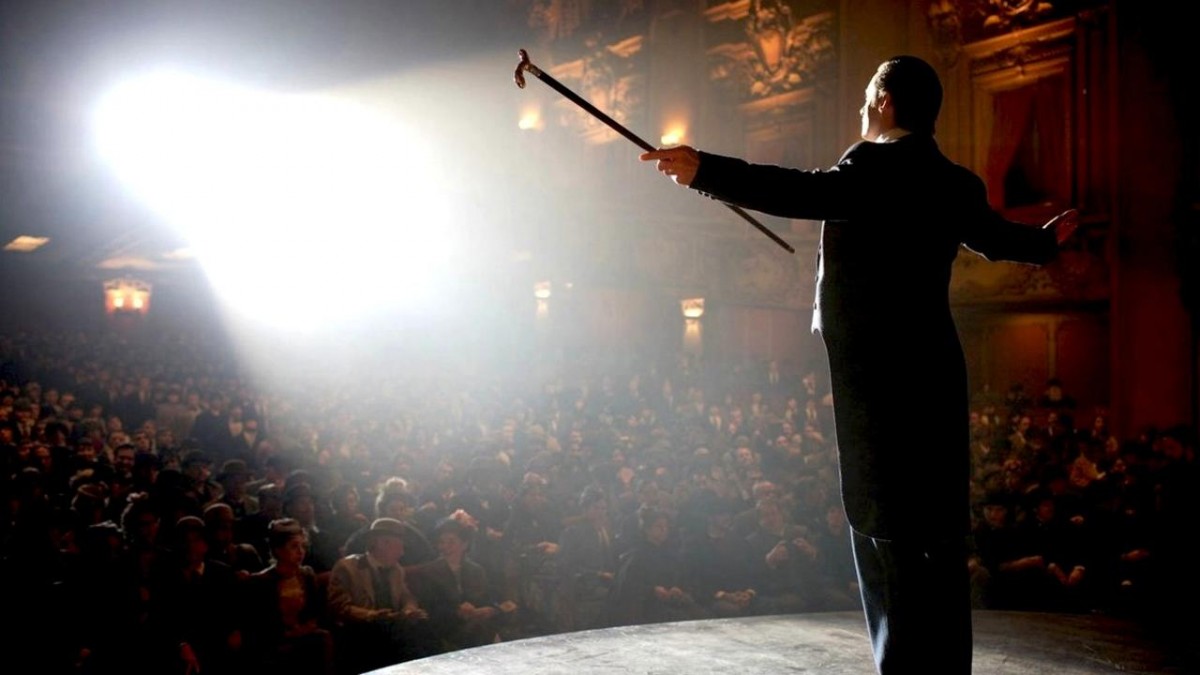
Instead of moving on immediately to another Batman film Nolan decided to make a smaller scale film. The Prestige (2006) was the true follow-up to his first two films. Set near the turn of the century in 1890s London, The Prestige chronicles the relationship between two magicians, Robert Algier (Hugh Jackman) and Alfred Borden (Christian Bale). The two were former friends and co-workers before a tragedy fractured their relationship. Algier is the more suave showman while Borden is the more naturally gifted magician. The two try to one up each other, which becomes an obsession, particularly for Angier. The Prestige is one of Nolan’s densest films. It benefits from multiple viewings, not just to spot clues to but to appreciate the themes once the context of events is clear.
The film is -as has been pointed out before- itself a magic trick and a metaphor for filmmaking as a form of magic: misdirection, entertainment, and making the audience believe in the unbelievable. As Angier remarks, it’s the “look on their faces,” the audience being fooled for just a second, which is why he and Borden became magicians.
Nolan would return to his Batman universe with 2008’s The Dark Knight, one of the most acclaimed superhero films ever made. Heath Ledger, who died before the film’s release, was left-field casting as the Joker but Ledger transformed himself to the character and would win the Best Supporting Actor Oscar, the only time an actor won for a superhero film.
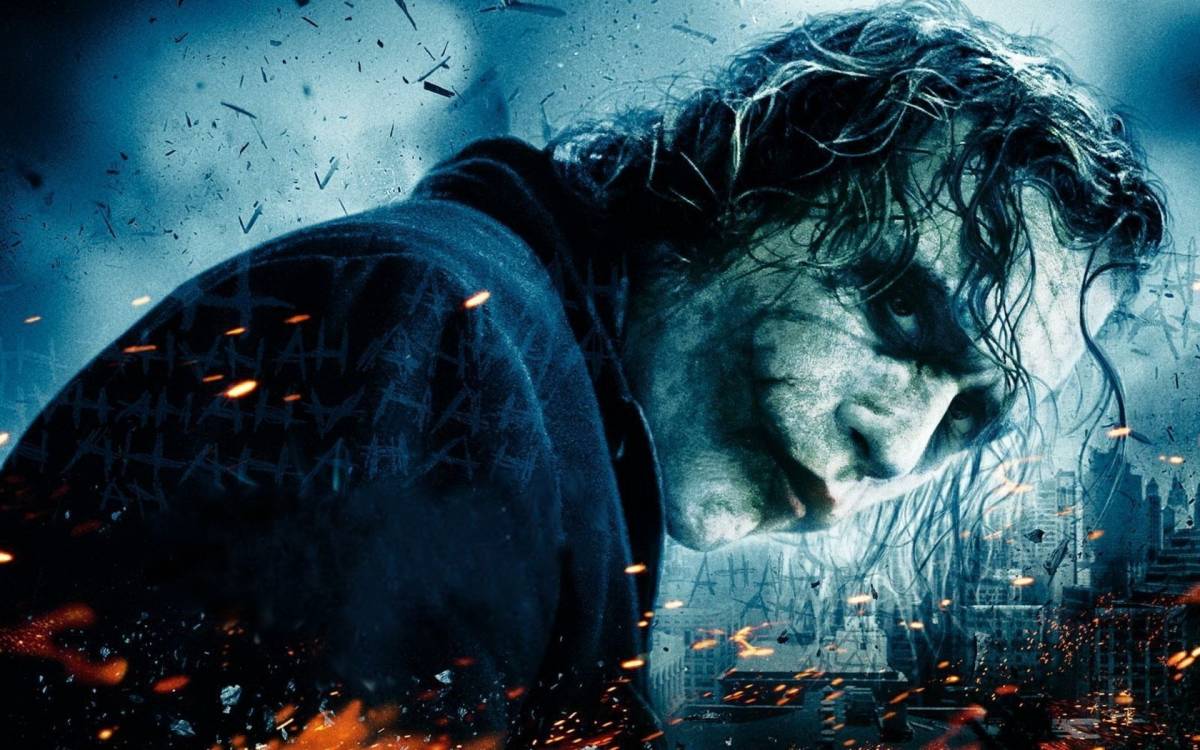
The Dark Knight is a superhero film but it also plays outside of the genre box. As I mentioned earlier the film was influenced by Michael Mann’s Heat (1995). The opening bank heist was an instant indicator of Mann’s influence and this wasn’t an atypical superhero film. Nolan’s use of IMAX cameras for certain scenes and moments also made The Dark Knight a must-see theatrical experience.
I also mentioned that The Dark Knight is a tragedy; the tragedy of DA Harvey Dent (Aaron Eckhart), the “White Knight” to Batman’s Dark Knight who becomes the disfigured Two-Face. The death of Dent’s love, Rachel (Maggie Gyllenhaal, replacing Katie Holmes), drives him to kill the people responsible, including Commissioner Gordon- to which he kidnaps Gordon’s family. Batman stops Dent but kills him in the process.
It wasn’t the first superhero movie to have a tragic end but it challenged the Batman character in a way we had never seen in a live-action film. He has to become the “villain” so Dent can be a martyr. The final shot of Batman driving off into the night remains one of the most most powerful statements a superhero film has made about its main character.
Nolan’s next film would be his first film not based on pre-existing material since Memento. Inception (2010) was the culmination of everything Nolan had up to that point: The non-linear/multiple storyline structure, the themes of memory, lost loved ones. And as with The Prestige, it’s a film about filmmaking. Inception uses the nature of dreams as a metaphor for filmmaking; and the main characters are stand-ins for various crew members.
Another great detail is its main character shares his name with Following’s Cobb, and Inception’s Cobb (Leonardo DiCaprio) is also a thief. In the future of corporate espionage, Cobb steals information by entering people’s dream- or at least enter a designed dream landscape Cobb is also a fugitive due to being blamed for his wife Mal’s (Marion Cotillard) suicide. Mal was convinced she and Cobb were still in a dream after being in limbo -the lowest dream level- for what seemed like decades. He can return to his children by pulling off a job for Saito (Ken Watanabe). The mission is not to steal but to plant an idea inside the mind of Robert Fischer (Cillian Murphy) so he will dismantle his dying father’s company.
The film is essentially a sci-fi heist film that’s also Nolan’s equivalent of Hitchcock’s Vertigo 1958). Both have their directors exploring their own psychologies. Cobb is Nolan’s avatar in this film, the director who’s assembled a team while confronting inner demons. Cobb is haunted by Mal in his dreams. It was Cobb who planted the idea in Mal’s head she was dreaming and he carries this guilt. It’s only through confronting the dream Mal that he’s able to let go of the real Mal. This conflict reflects films being emotional cathartic even though we’re often watching fiction.
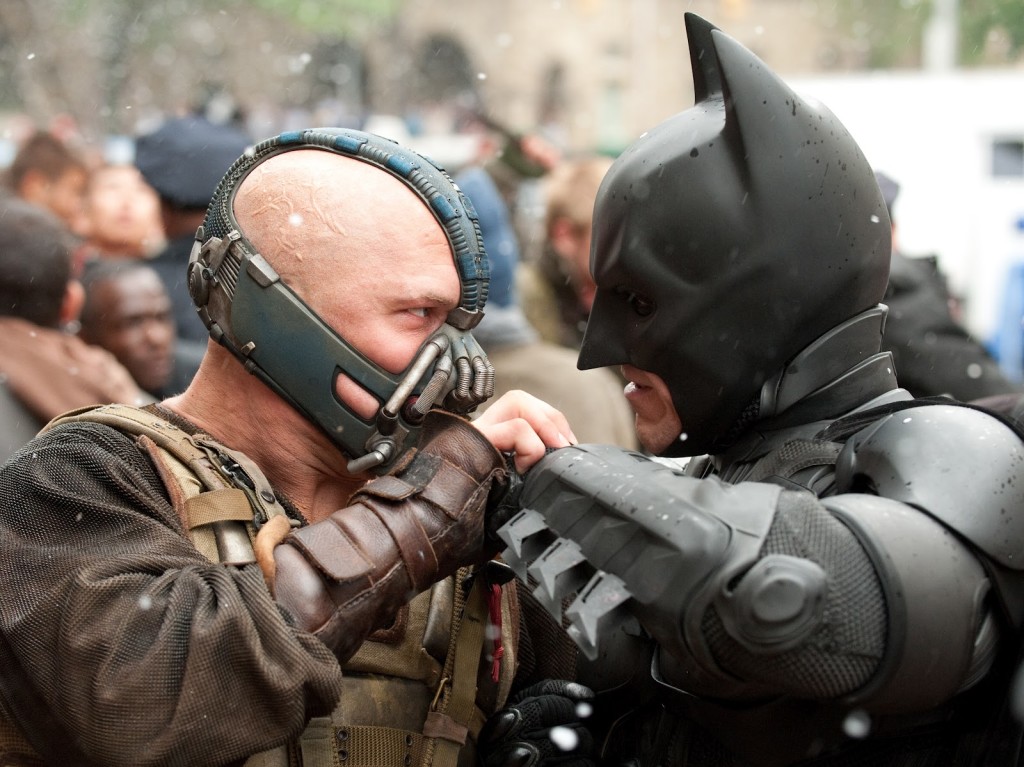
Nolan would focus on emotional catharsis again in 2012’s The Dark Knight Rises, the Batman Trilogy conclusion. The film does suffer from being a follow-up to The Dark Knight and can’t quite overcome the third movie problem. At the same time, I love its operatic scale and Tom Hardy’s Bane, one of the most distinct villains in recent memory. The contrast between Bane’s physicality and his posh British voice makes Bane both funny and unsettling. And Anne Hathaway makes an alluring and complicated Selina Kyle/Catwoman.
Dent’s death led to the city being cleaned up for good, making Batman obsolete. But Bruce is still tormented by Rachel’s death and can’t exorcise the Batman side of his personality. The whole film is Bruce finally being able to move on from Batman. This is the rare superhero series that give its hero an actual ending.
After Nolan finished with Batman, he made his grandest and most emotional film to date, Interstellar (2014). It is a tragic and haunting film, essentially about a man, Cooper (Matthew McConaughey), a former NASA pilot, having to leave his family to embark on a mission to search for a habitable planet for the denizens of a dying Earth. He’s accompanied by a crew that includes Dr. Amelia Brand (Hathaway in her second consecutive Nolan film).
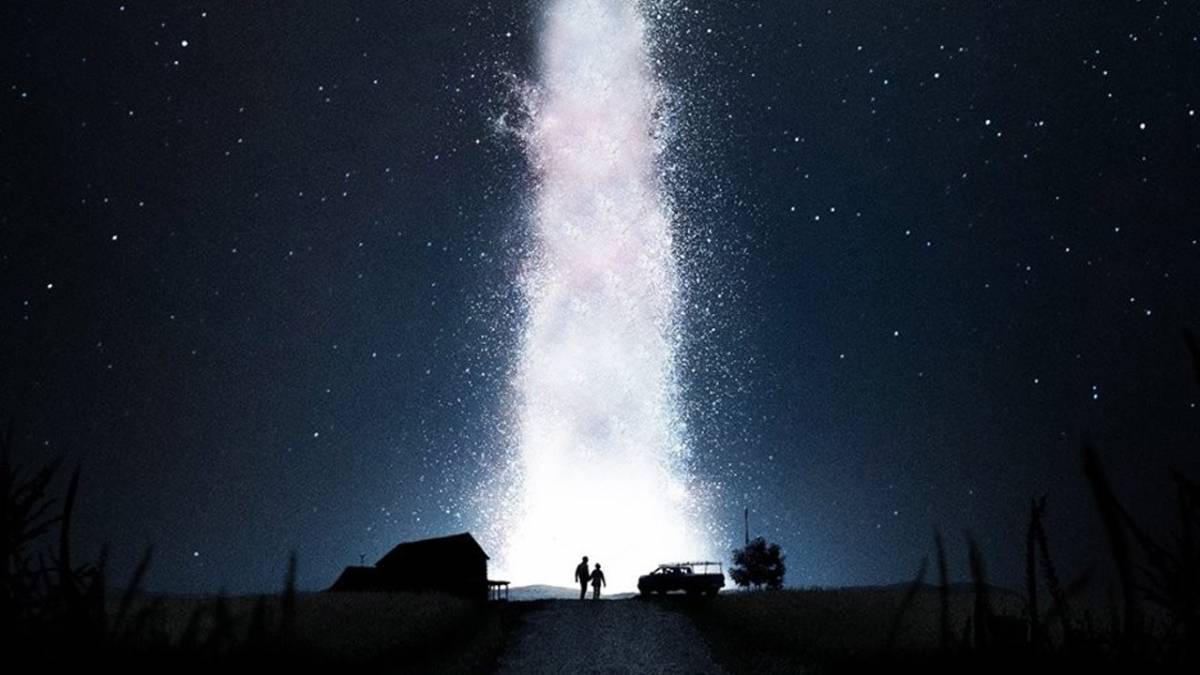
In Inception, we never really know who Cobb’s children are. Here we see the bond between Cooper and Murph (Mackenzie Foy) and the metaphysical and paradoxical climax actually hinges on that relationship. The film was polarizing upon release, which I believe is partly due to this climax, which that proclaimed love can transcend space and time, a sentiment can come across as mawkish. But in the nearly three years since its release, it’s a contender one of Nolan’s most accomplished -if flawed- achievements.
Nolan has made several of the most Wagnerian epics in recent blockbuster history, which is impressive in the current Hollywood landscape. His legacy will be that of a director who was able to retain his personal vision while moving from independent features to large-scale Hollywood films. He’ll also be remembered for his championing of shooting on film and being the first filmmaker to shoot scenes for a non-documentary with IMAX cameras (The Dark Knight).
Dunkirk is already being hailed by several critics as Nolan’s best work to date and is garnering Oscar buzz. That Nolan could possibly win a Best Director Oscar next year is a real possibility. If he doesn’t, he remains in good company with other filmmakers who always committed to their visions: Kubrick, Alfred Hitchcock, Howard Hawks and Orson Welles- and perhaps one day he’ll be viewed with the same reverence as these directors
Some of the coverage you find on Cultured Vultures contains affiliate links, which provide us with small commissions based on purchases made from visiting our site.
